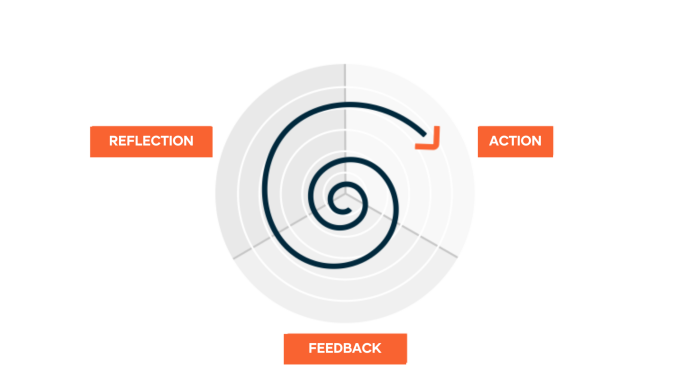Quality
All Thomas More study programmes are accredited by the Accreditation Organisation of the Netherlands and Flanders (Nederlands-Vlaamse Accreditatieorganisatie, NVAO). The accreditation reports are available on the Higher Education Register of the Flemish Ministry of Education and Training.
Our quality assurance is based on four pillars:
- Commitment to creating a culture of quality;
- Rapid action and short feedback loops in the ‘growth spiral’;
- Continuous monitoring of data via the dashboard and the ‘policy compass’;
- 6-yearly in-depth analysis of the study programme’s quality with our ‘education mirror’.
Quality culture
Thomas More is firmly committed to creating a strong culture of quality. We aim to continuously learn, improve and innovate so that we can strengthen our students and exceed both their expectations and those of the work field. We strengthen quality by:
- Continuously soliciting feedback,
- Reflecting on it,
- Adjusting our actions accordingly,
- All the while maintaining a strong focus on innovation.
Everyone is responsible for quality. In the case of our study programmes, it’s the programme teams that have ownership and responsibility over the quality of our programmes.
With the growth spiral, we make explicit the three elements of quality development and the relationship between them: action, feedback, reflection (and action again…). The growth spiral thus reinforces the operational dynamics at Thomas More. An organisation that succeeds in making this growth spiral and resulting continuous improvement a reality at all levels, is a learning organisation.
Thomas More constantly keeps track of progress and changes, and quickly makes adjustments where necessary. We involve students, alumni and the work field where relevant and possible. Only then can we achieve the best results and exceed the expectations of our students and the work field. During the periodical institutional review of Thomas More, NVAO acknowledged this. They noted that there are “few institutions where improvement policy is managed so profoundly on the work floor. Cycles are short and people fast to respond if necessary. It is very clear that there is a culture of quality”.
The growth spiral is powered by data. We continuously track and monitor this data in our dashboard. This dashboard allows programme teams to gain insights into student enrolment, retention and graduation rates, and into the results of the satisfaction surveys of their most important stakeholders, i.e. students, the work field and teachers.
The policy compass allows us to safeguard the quality of the study programmes and ensure proper monitoring. This tool contains core documents and the annual plans of the programme teams, units and services. It feeds the triennial discussion by managers with units and the programme teams.

The icing on our quality cake is the six-yearly education mirror, that allows us to take an in-depth look at the quality of each study programme. With the education mirror, we pursue a two goals:
- Externally, to ensure the quality of the degree for students, the work field and the government.
- Internally, to continue to develop a culture of quality and support the programme teams in doing so too.
A file containing information on all educational aspects of the study programme is the starting point of the education mirror. We start from readily available information: the dashboard, the policy compass and the internet. We submit the file to the programme teams and students for complementary input.
Based on this file, a visit is prepared by a panel, which consists of:
- An external education expert (chair),
- An external domain expert,
- An internal education expert,
- A student from another study programme,
- One or more representatives of the work field.
In order to work sufficiently in-depth, the chair of the panel and the relevant programme manager determine a limited number of themes that will be covered during the visit. One theme is always dedicated to the final level and professional orientation of the study programme.
During the visit, we bring all stakeholders together (“getting the whole system in the room”): students, teachers, alumni, work field, managers. Together with the panel, the interlocutors identify strengths and development opportunities of the study programme.
The education mirror report indicates how the study programme accomplishes the right level and orientation. It also contains ideas and suggestions for the study programme to develop further. In the report, the programme teams also describe their development ambitions. Management discusses the report with the programme manager and the chair of the panel. Every study programme that has gone through the education mirror process receives support from the institution, either to address bottlenecks or to support development ambitions. Upon completion of the process, the report is published on the website.
Conclusion
Our focus on quality is characterised by:
- The importance of feedback culture with quick action and involvement of all stakeholders.
- Emphasis on ownership and placing responsibility for quality in the hands of those closest to the core process.
- Focus on continuous development and strengthening.
Reports
All our study programmes are accredited based on a positive assessment by a review committee.
